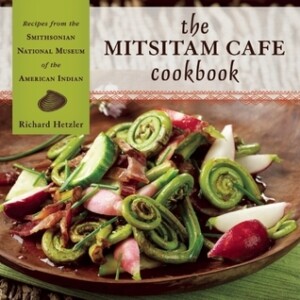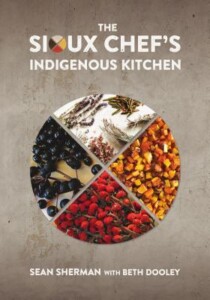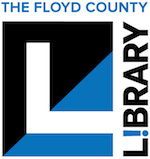This is the last full week of Native American Heritage Month, and the week our nation observes its Thanksgiving celebration. To honor those who lived here first, as well as our national pastime of eating delicious food, let’s take a look at two cookbooks in the library collection with insight and history into indigenous food traditions.
 The Mitsitam Cafe Cookbook: Recipes from the Smithsonian National Museum of the American Indian (2010). On a years-ago trip to Washington, DC, I received a piece of advice I have shared with every acquaintance visiting DC since: eat a meal at the Smithsonian Museum of the American Indian. I was in town for nine days and easily the best meal I had was in the museum cafe. It’s organized based on the geographic region the indigenous tribe or nation would have lived in when they created the recipe, using traditional ingredients to showcase how the indigenous peoples of North and South America might have fed you, if you were their guest. If you can’t make it to the museum cafe itself anytime soon, you can get the next best thing with this impressively researched and attractively photographed cookbook. There are some ingredients that may require trips to specialty stores, but the information and delectable possible meals in the book makes it more than worth a look regardless.
The Mitsitam Cafe Cookbook: Recipes from the Smithsonian National Museum of the American Indian (2010). On a years-ago trip to Washington, DC, I received a piece of advice I have shared with every acquaintance visiting DC since: eat a meal at the Smithsonian Museum of the American Indian. I was in town for nine days and easily the best meal I had was in the museum cafe. It’s organized based on the geographic region the indigenous tribe or nation would have lived in when they created the recipe, using traditional ingredients to showcase how the indigenous peoples of North and South America might have fed you, if you were their guest. If you can’t make it to the museum cafe itself anytime soon, you can get the next best thing with this impressively researched and attractively photographed cookbook. There are some ingredients that may require trips to specialty stores, but the information and delectable possible meals in the book makes it more than worth a look regardless.
 The Sioux Chef’s Indigenous Kitchen (2017) (ebook on OverDrive). I love the joke in this title: Sioux chef, like sous chef, get it? This book won a James Beard Award in 2018 (an award given to chefs and food writers for excellence and innovation) and it’s easy to see why. Sherman dispels outdated notions of Native American fare—no fry bread or Indian tacos here—and no European staples such as wheat flour, dairy products, sugar, and domestic pork and beef. The Sioux Chef’s healthful plates embrace venison and rabbit, river and lake trout, duck and quail, wild turkey, blueberries, sage, sumac, timpsula or wild turnip, plums, purslane, and abundant wildflowers. Contemporary and authentic, his dishes feature cedar braised bison, griddled wild rice cakes, amaranth crackers with smoked white bean paste, three sisters salad, deviled duck eggs, smoked turkey soup, dried meats, roasted corn sorbet, and hazelnut–maple bites. The recipes are simple but Sherman’s thoughts on the politics of food are complex and worthwhile.
The Sioux Chef’s Indigenous Kitchen (2017) (ebook on OverDrive). I love the joke in this title: Sioux chef, like sous chef, get it? This book won a James Beard Award in 2018 (an award given to chefs and food writers for excellence and innovation) and it’s easy to see why. Sherman dispels outdated notions of Native American fare—no fry bread or Indian tacos here—and no European staples such as wheat flour, dairy products, sugar, and domestic pork and beef. The Sioux Chef’s healthful plates embrace venison and rabbit, river and lake trout, duck and quail, wild turkey, blueberries, sage, sumac, timpsula or wild turnip, plums, purslane, and abundant wildflowers. Contemporary and authentic, his dishes feature cedar braised bison, griddled wild rice cakes, amaranth crackers with smoked white bean paste, three sisters salad, deviled duck eggs, smoked turkey soup, dried meats, roasted corn sorbet, and hazelnut–maple bites. The recipes are simple but Sherman’s thoughts on the politics of food are complex and worthwhile.
Have a happy holiday, and if you feel so inclined, consider learning about organizations that support Natives.
